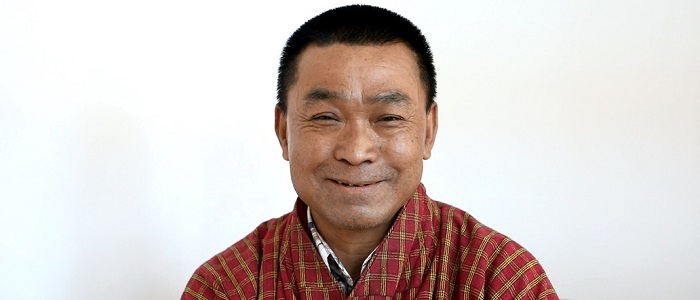
Five Questions with Dr. Phanchung, who took over as the Director General of the Department of Research and External Relations at the Royal University of Bhutan from August 2015. The Institute for Gross National Happiness Studies at the University received a small grant from GDN, via the International Development Research Centre, to support local, high-quality research training and development opportunities in 2014-16.
Q. You started off your ‘research life’ in the animal sciences. What did you learn about research in those early days?
I studied at the Veterinary College in Hyderabad India. In those days, Bhutan did not offer much by way of a college education to youngsters. After my graduation, I became involved in the farming industry – or livestock farming to be precise. Back then, and even now, Bhutan was largely agrarian. The regional research I was involved in through the ICIMODproject found that good marketing was the key for dairy businesses in Bhutan to survive. We were able to make recommendations to the government on how to do this through paper presentations, such as by improving the road networks to link farmers to markets. Research, I learned, is key to the development of my country.
Q. Today you look after a large university research program. What does this entail?
Research activity in the university is very new. As the Director General of the Department of Research in the Royal University of Bhutan, I look after research pursued by faculty across the Colleges to strengthen teaching and learning of about 60 programs at undergraduate and post-graduate levels. My subject horizon has become very wide, and I must be involved in managing research programs in many disciplines, including the social sciences. When I started in this job, the university focused primarily on teaching: i.e., on making sure students could access the latest and best knowledge in a particular field of study. Slowly, we became aware of the necessity of research, and the value of pushing the boundaries of our knowledge. In fact, along with teaching (and community service), research is now a mandatory part of the requirements of the faculty in the university. We have also introduced research opportunities for students. I see that our research culture is now improving, and that research is becoming a priority in Bhutan. We are learning that if you do good research – well reviewed, well documented – then it has the potential to influence policy.
Q. Tell us about the GDN grant – how did this help the university to focus on research?
GDN has been very much instrumental in helping the university to do more research. We were already interested in building the capacity for research at the University, when we came across the opportunity to work with GDN to develop the quality of our research programs. Getting people together to discuss their research, ensure that its peer reviewed, etc., costs some money, and this is where the monetary part of the grant was useful. In addition, we were able to put in place a policy document for doing research at the university level. Our faculty is now on-board with the idea that we need to do some original research – perhaps in the form of case assignments – to increase the quality of teaching in our classrooms. In 2013, before GDN’s support, around 20 staff became involved in faculty research meets, but in 2016, this number grew to 100. The proportion of staff involved in research, by accessing the university research fund, has grown from about 16 in 2013 to over 40 in 2016.
Q. What key actions did you take to achieve this result?
We undertook a four point program: One: We got the Deans of Research across the Colleges within the University together to envision and plan for undertaking research on an ongoing basis. This involved visiting research centers of excellence. Two: We invested in the institutional development of RUB research centers, by helping create research action plans and reviewing their progress. Three: We trained faculty to execute small research projects, through mentoring and support. And four: We encouraged student engagement in research. Research is now a part of most curricula offered by the colleges and a new culture of enthusiasm for research is now being nurtured in all College campuses.
Q. What’s next for research at the Royal University of Bhutan?
We have embarked on a journey to improve our research programs. It’s been quite successful. We have managed to train staff and students to write achievable research proposals and make sure that their methods are solid. Teachers and students are so motivated that they often carry out independent research during semester breaks or work during weekends. One of the problems we have now – and it a good problem – is that we have created a high demand for research. But we don’t always have the resources to support each proposal that comes our way. Doing research costs money. It would be good if we could find more funding to support their projects. Last year, we introduced as series of Vice Chancellors Symposiums in Bhutan, so that relevant research findings can be shared with policy makers. This is also an activity that we would like to continue. Our research capacity building model is highly appreciated and we hope to share our learning with similar institutions in South Asia.
More: Watch the film, Research is Development: Testimonies from the Royal University of Bhutan. Visit the Royal University of Bhutan online or find out about the International Center for Integrated Mountain Development, ICIMOD, a regional center for the Hindu Kush region in the Himalayas.
In conversation with Madhuri Dass Woudenberg, Head of Communications, Global Development Network, June, 2017.
